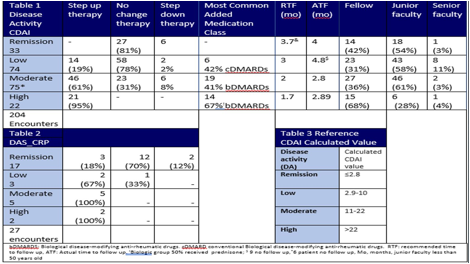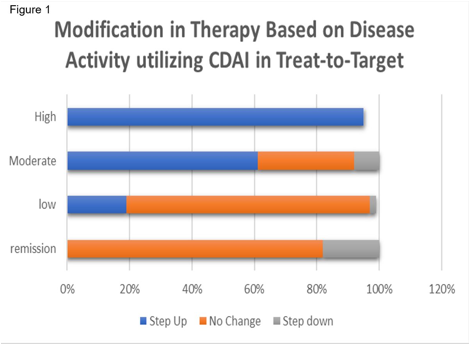Session Information
Session Type: ACR/ARHP Combined Abstract Session
Session Time: 9:00AM-11:00AM
Background/Purpose: Rheumatoid arthritis (RA) is a chronic inflammatory arthritis that, if undertreated, can lead to cumulative damage and disability. The goal of treatment is to achieve the lowest possible disease activity. The current recommendations from ACR is to adopt a Òtreat to targetÓ strategy (1). In order to quantify disease activity and monitor it over time, disease activity score calculators (DAC) were developed.
DAC were validated, incorporating subjective and objective data such as: patient pain level, patient perception of disease activity (PtGA), provider perception of disease activity based on history and exam (PrGA), the swollen joint count (SJC), the tender joint count (TJC) and timely laboratory values. In a treat-to-target strategy, treatment is adjusted in accordance with disease activity scores to achieve remission (2).
The Clinical Disease Activity Index (CDAI), Disease Activity Score 28 (DAS 28), and DAS28-CRP are three methods that incorporate subjective and objective data. The result is classified into 4 groups: remission, low disease, moderate disease, and high disease activity. Adjustment of therapy may entail changing one anti-rheumatic drug to another, the addition of a new drug or the maintenance of current regimen.
Methods: Our study employs a before-after design, retrospectively examining the adoption of EMR-DAC, of patients >18 years of age, with an ICD9/10 code of RA, seen 18 months before and after introduction of the EMR-DAC in 3/2015 within the Drexel Rheumatology practices. We hypothesized that provider documentation of disease activity would increase after DAC were built into the EMR. We hypothesized that calculation of an objective score would lead to a higher rate of medication changes and decreased time to first biologic.
Results: Of the 900 patients seen in Drexel Rheumatology practice from 3/2015 to 9/2016, 23% had a CDAI documented. Preliminary CDAI data showed that of the 97 patients with moderate or high disease activity, 61% and 95% respectively had a change in therapy. In the DAS 28-CRP study group, 100% of the patients with moderate to high disease activity were started on additional therapy, with 75% prescribed or recommended a bDMARD and prednisone. 67% of the low disease activity patients were started on additional medications.
Conclusion: Our preliminary results show a low adoption rate of DACs, with CDAI being the most commonly used. Our data show DAC values do correlate with overall changes in patient care in our practice and suggest that providers are incorporating the values in implementing a treat-to-target strategy.
To cite this abstract in AMA style:
Jayatilleke A, Pompa S. Built-in-Electronic-Medical-Record Disease Activity Calculators and Treat-to-Target in Rheumatoid Arthritis [abstract]. Arthritis Rheumatol. 2018; 70 (suppl 9). https://acrabstracts.org/abstract/built-in-electronic-medical-record-disease-activity-calculators-and-treat-to-target-in-rheumatoid-arthritis/. Accessed .« Back to 2018 ACR/ARHP Annual Meeting
ACR Meeting Abstracts - https://acrabstracts.org/abstract/built-in-electronic-medical-record-disease-activity-calculators-and-treat-to-target-in-rheumatoid-arthritis/


